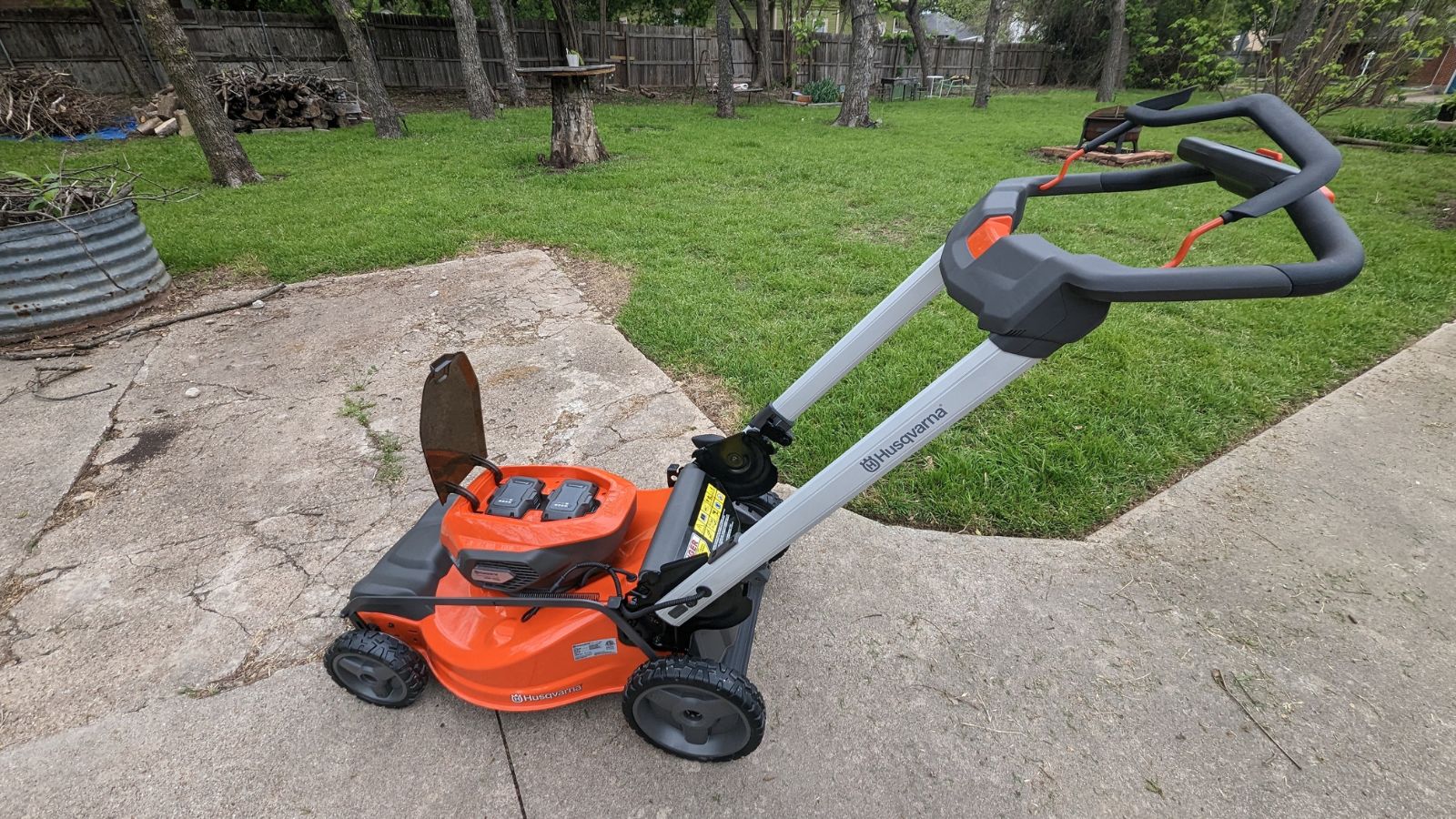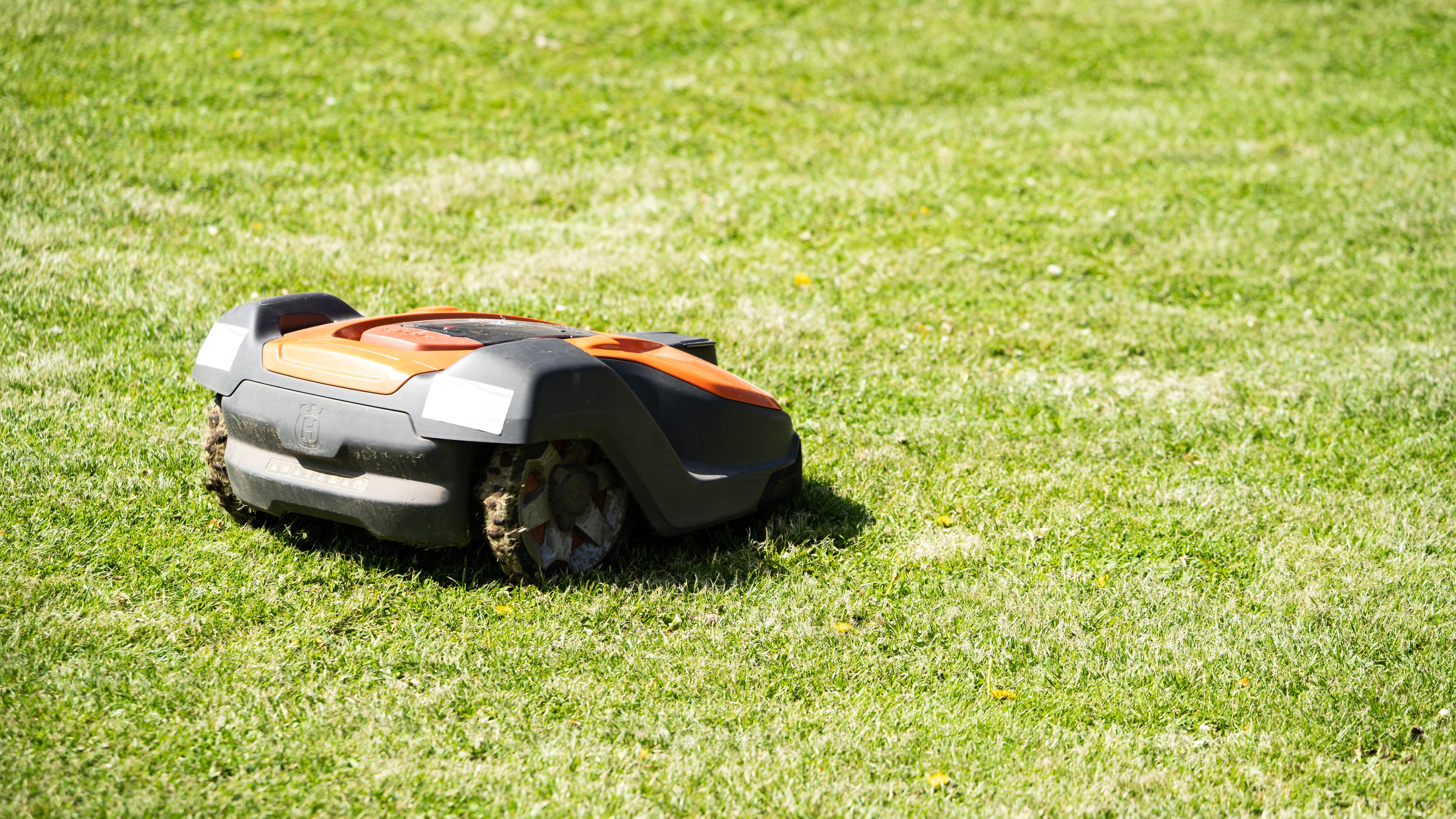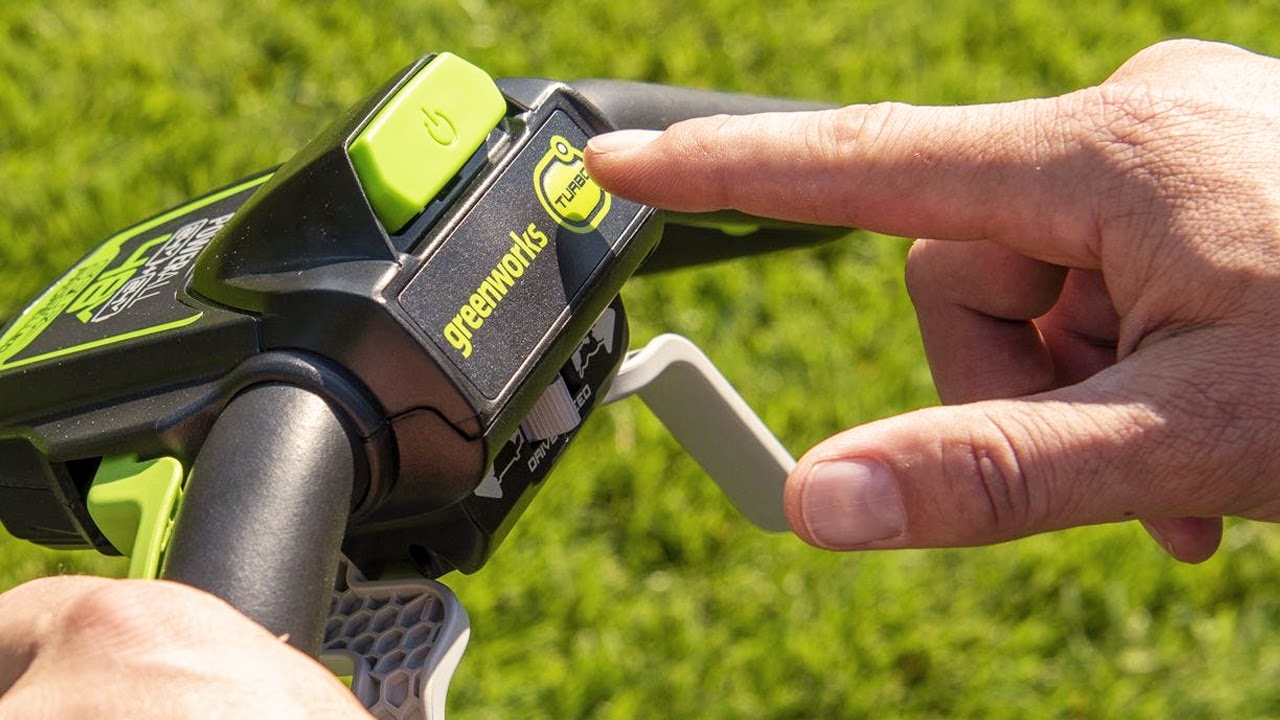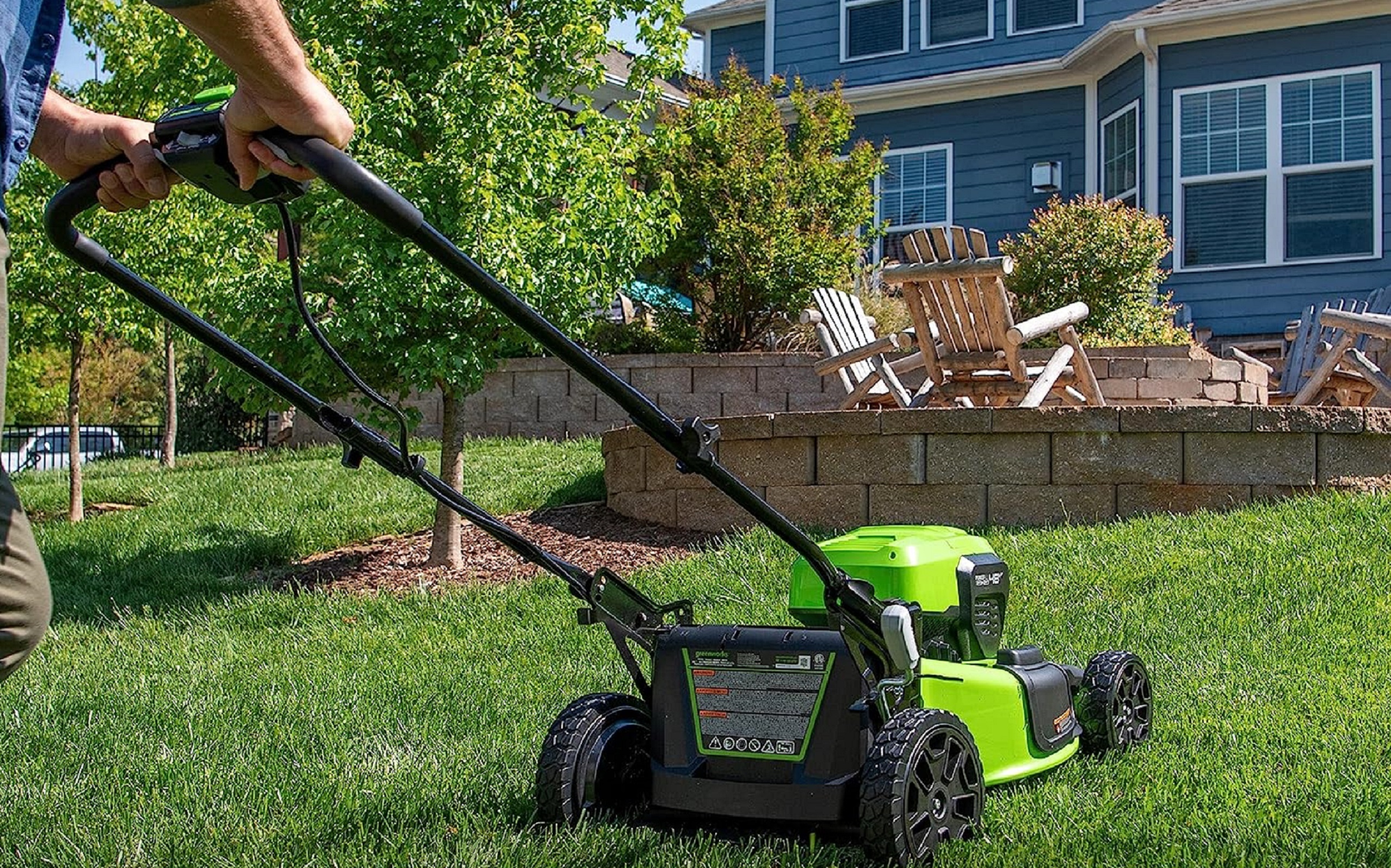How to choose an electric lawn mower
Power up your mowing game

Sign up to receive the latest news, reviews, buying guides and deals direct to your inbox
You are now subscribed
Your newsletter sign-up was successful
Choosing the best electric lawn mower for you feels a little like counting the blades of grass in a lawn. The options are seemingly infinite, and it can be hard to tell what really sets one version apart from another. You could be forgiven for quitting the search and simply buying the mower with the coolest name, or the most appealing design.
We strongly advise against doing so, however, as your choice of mower will noticeably impact the condition of your lawn, your household budget and the quality of your experience as the mower’s user. Like most hard decisions, this matters.
In this guide, we’ll talk you through the factors to consider when buying a mower – from fundamentals like the type of the mower and its power source, to fine details such as the width of the mowing deck.
Adding his expert input is Brian Fullerton, proprietor of Brian’s Lawn Maintenance in Wixom, Michigan, who has contributed his advice on some of the key questions that should play into your decision on which lawn mower to buy.
“Choosing your next lawn mower can be a little overwhelming, as there's a wide selection these days between engine options, deck sizes, specialty features, and brands to choose from,” says Brian.
“Looking at a good selection of factors when selecting a mower is worth the effort, as the right model will help you to get your lawn looking its absolute best.”

Brian Fullerton launched his business, Brian's Lawn Maintenance, out of Michigan in 2007. Besides offering a wide range of lawn care services, Fullerton runs one of the world's most popular lawn-focused YouTube channels, with over 200,000 subscribers at the time of writing.
We'll also hear from Martin Stewart, a National Trainer at Ryobi, who's here to provide a lawn mower manufacturer's insights into which model to choose.
Sign up to receive the latest news, reviews, buying guides and deals direct to your inbox
If you're reading this article, it's likely that you've already decided on one key question that separates the best lawn mowers: whether to buy a gas-powered model, or an electric one.
Electric lawn mowers used to be thought of as offering inferior performance to gas mowers – especially battery powered mowers, which sometimes had poor runtime and mowing power. However, the lithium-ion battery tech in cordless electric lawn mowers has improved over recent decades, and the difference in mowing capabilities between gas and electric mowers has dwindled.
It's true that gas mowers provide good assurance of runtime – but so do many electric mowers, these days. On top of that, electric models have numerous advantages. They have fewer maintenance requirements (you won't need to replace components like a spark plug or air filter, and there's no oil that'll need changing on a regular basis. And more importantly, cordless electric mowers offer convenient operation and relatively low emissions.
“Electric mowers, whether corded or cordless, are generally quieter, require less maintenance, and most suitable for the average user,” says Ryobi’s Martin Stewart.
“For complete freedom, cordless is the way to go. Innovations in battery technology have meant this type of mower can now have the same or better power output as environmentally-unfriendly petrol equivalents, and more runtime.”

Martin Stewart is a National Trainer and FME Supervisor at Techtronic Industries (TTI), the parent company of Ryobi, the leading tool manufacturer. Ryobi makes a wide-range of lawncare products, ranging from lawn mowers and aerators to seed spreaders.
Simply put, you've made a good choice by deciding on an electric mower, rather than a gas model. Now let's look at the factors that will help you narrow down your search.
How to choose an electric lawn mower
1. Mower type
There are many different types of electric lawn mower. Choosing the most appropriate one is going to be the first factor to get right when deciding which mower to buy.
The most popular types of electric lawn mower include push, riding, and robot.

Choosing the right type of electric lawn mower may help you keep your noise levels in check. Mowing the lawn usually generates a lot of noise, and most lawn mowers have a noise rating between about 80 dB and over 90 dB.
For homeowners whose top priority is quiet operation, a robotic lawn mower could be a smart bet. Robotic lawn mowers are far quieter than push mowers or ride-on lawn mowers, as they tend to cut the grass with small, sharp blades, rather than using a big, blunt(-ish), blade that spins rapidly. Meanwhile, ride-on mowers are generally regarded as the worst auditory offenders.
The difference of a few decibels can make quite a significant impact on the listener’s experience of a sound, so you may find it worthwhile to compare the noise ratings (in dB) given on the spec sheets of a few different lawn mowers.
2. Lawn size
While you might feel the urge to buy a big, impressive lawn mower, it’s usually smartest to match the size of your chosen mower carefully to the size of your lawn. Choosing an appropriately sized mower saves on storage space, and limits upfront expenditure and ongoing costs.
“Selecting the right-sized mower and cutting deck is fundamental,” says Brian.
“A small push mower would be great for someone with a small lawn of less than a quarter acre. And at the other end of the scale, a lawn tractor or zero-turn mower would be more appropriate if you have an acre or more.”
Of course, there are plenty of lawns that fall somewhere in between those two extremes – and it’s these in-between lawns that can be hardest to buy a mower for.
One specification you can look at is a mower’s cutting width. (In push lawn mowers, this is sometimes referred to as the deck width.) Helpfully, some lawn mower manufacturers also specify the maximum intended cutting area for a lawn mower, in square feet or square meters.
3. Brands
There are many excellent electric lawn mower brands out there, offering a wide range of price points and mower specs.
In the electric push lawn mower category, the leading manufactures include Ryobi, Greenworks and EGO. Personally, I've been using the same Ryobi cordless lawn mower (now discontinued, but similar to this model at Amazon) since the spring of 2018, and have found it to perform faultlessly during that time.
Robotic lawn mowers are a little more specialized, and understandably, there are fewer well-known brands out there. Husqvarna and WORX are two of the leaders in this futuristic field – and in my personal experience as a product reviewer, Husqvarna Automower models (available at Amazon) are the best you can get.
4. Corded or cordless?
Until the last few decades, there was only once way to power an electric lawn mower: with household electricity (or ‘mains’ electricity, as it is known in the UK).
Corded electric lawn mowers are still fairly common, and they have some great attributes. They never run out of power, and they tend to come at an affordable price.
However, many electric lawn mower users are switching to cordless electric lawn mowers, which are powered by rechargeable lithium-ion batteries that must be recharged via a charger between uses.
Cordless mowers have a major advantage over corded models, in that the user does not need to carefully handle a trailing power cable while they mow the lawn. In recent years, advances in cordless mower tech have delivered improvements in terms of power output and runtime. The only real downsides to a cordless electric mower are the relatively high price, and the occasional frustration you’ll experience when the batteries run out of charge, mid-mow. To ensure a higher runtime, look for a mower that’s compatible with relatively high-capacity lithium-ion batteries (e.g. 5.0Ah rather than 2.0Ah).

5. Weight
If you’re buying a push lawn mower, then you’ll need to make sure that your chosen model is lightweight enough for you to carry (or push) between its storage space and the lawn.
Lawn mowers can be pretty heavy, with most push models weighing somewhere from 50 to 80 lbs, when the weight of batteries is factored in.
Corded electric mowers are often relatively lightweight, thanks to the absence of the lithium-ion batteries that you'd get with a cordless model, which can add a lot of weight. If you're going to buy a cordless lawn mower, but you're concerned about the weight of the mower, then you could shed some ounces by choosing a relatively small compatible battery (although this will come at the expense of some runtime).
It’s always a good idea to check the weight of a mower, before you buy. This should be given in lbs or kgs on the product’s spec sheet.
6. Self propelled vs hand push
Another distinguishing factor between electric mowers is their propulsion method: self-propelled or hand-push.
Self-propelled push lawn mowers use some of their electricity to drive themselves forward, meaning the user can steer them across the lawn with less manual effort.
Meanwhile, hand-pushed mowers leave all of the pushing up to the user, while using electricity for mowing only.
While they're easier on the arm, self-propelled mowers do have a few downsides. They use electricity more quickly than their hand-push counterparts, and they tend to be more expensive to buy.
According to Martin, an important factor to consider when choosing between these options is the terrain on which your lawn grows.
"If you're dealing with hilly terrain, consider a self-propelled mower for less pushing and easier maneuverability," he says.
"For flat terrain, almost any type of mower can be used."
7. Battery systems
If you've decided to buy a cordless electric lawn mower, then the battery system used to power your mower will be an important decision factor.
Mower manufacturers such as Ryobi, EGO, Toro and Greenworks have interchangeable batteries across their ranges of power tools, meaning you can use the same lithium-ion that you'd use with the same brand's cordless drill or chainsaw to power your lawn mower.
When going cordless, it makes sense to stick with one system, especially if you already own tools from the same brand. This will enable you to get longer runtime by switching between batteries accumulated through buying multiple products – or save money by buying some of your cordless products without a battery. Look for 'tool-only', 'bare tool' or 'bare unit' in the product description, to find a cordless mower that comes without a battery (but do bear in mind that some cordless mowers require two lithium-ion batteries at once).

8. Storage solutions
Lawn mowers spend most of their time in storage, so it makes sense to consider ease-of-storage as a key decision factor in your search for a mower.
“Consider the storage space you have within your home or yard,” says Martin.
He points our that certain models may be simpler to store than others: “Some mowers are foldable or have a compact design for easier storage.”
We found the EGO Power+ LM2135SP 21-Inch Select Cut Lawn Mower easy to store, thanks to its foldable handle assembly.
9. Availability of support and servicing
A lawn mower can (and should) be a long-term investment – especially if you take good care of it and store it properly over winter.
Over years of use, it’s likely that the mower will require servicing or repairs at least once or twice. It’s a good idea to identify how and where you can access this type of help, before you buy.
Many mowers are sold under a manufacturer’s warranty. So, the buyer can get their mower fixed by the manufacturer, provided that it breaks down within the warranty period (typically between 1 and 7 years of purchase) and that the malfunction falls under the warranty scope (e.g. it happened due to a mechanical fault).
Looking beyond a mower’s warranty period, Brian recommends investigating the availability of support for specific brands and types of lawn mower in your locality.
“You should aim to buy a brand that your local dealer or store sells, so the mower can be serviced and repaired quickly when breakdowns inevitably happen,” he says.
Ensuring your mower can be maintained long-term helps both the environment and your household budget, so it pays to ensure ongoing support is conveniently available before you buy.
10. Pricing (and availability of deals)
A good electric lawn mower will last you anywhere from five years upwards (and perhaps even as long as ten to twenty years). With this in mind, your mower is one yard tool on which you may want to spend a little extra budget.
In the US, push mower prices start from around $100, while in the UK we’ve seen budget models sold for around £70. To get a really good push lawn mower, you’re looking at a cost starting from around £200 (UK) or $250 (US).
Robotic lawn mowers tend to be considerably more expensive, which makes sense, given that these machines need to combine excellent weather-hardiness with advanced tech for traversal, security and more. Prices range from about $700 to $2,000+ in the US, and £500 to £1,500 in the UK. Electric ride-on lawn mowers are a whole different ballgame, with prices in the 1,000s in either currency.
Electric lawn mowers are frequently discounted in seasonal sales, providing an opportunity to buy a better standard of mower without increasing your up-front spend. Good times of year to monitor for mower discounts include Black Friday and during the January Sales. And whatever the season, it’s worth checking our roundup of the best lawn mower deals.

Pete has reviewed hundreds of gardening products for titles including TopTenReviews, Ideal Home and the London Evening Standard, as well as writing articles on diverse topics for other publications such as The Guardian and BBC Good Food. Pete loves spending time in his yard – although, having just read The Day of the Triffids by John Wyndham, he is regarding his plants with a newfound suspicion.
